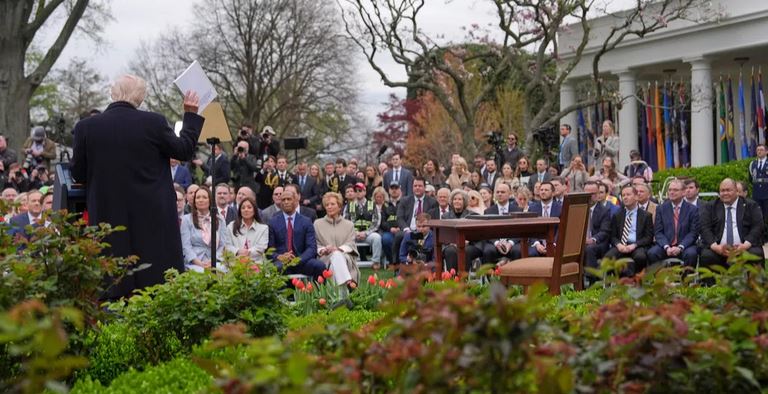Global reactions to US ‘Reciprocal’ tariffs remain cautious

Trump introduced the tariffs, ranging from 10% to 49%, as “reciprocal” measures, arguing that they merely mirror the trade policies other nations have imposed on the U.S. for decades.
“Taxpayers have been exploited for over 50 years,” Trump said. “But that stops now.”
He asserted that the move would restore jobs and manufacturing to the U.S., framing it as both an economic necessity and a matter of national security.
Market Uncertainty
The announcement rattled financial markets, with U.S. stock futures dropping by up to 3% early Thursday, while Tokyo’s stock exchange led declines in Asia. Oil prices fell by more than $2 per barrel, and bitcoin slipped 4.4%.
Seeking Alternatives to a Trade War
In response, the British government reaffirmed its close ties with the U.S., with Business Secretary Jonathan Reynolds expressing hopes for a trade deal to counteract the impact of the 10% tariffs on British exports.
“Nobody wants a trade war, and we remain focused on reaching an agreement,” Reynolds said. “However, we will take necessary measures to protect the U.K.’s national interest.”
Italian Prime Minister Giorgia Meloni criticized the 20% tariffs imposed on the EU, calling them “misguided” and warning of negative consequences for both sides.
“We will do everything possible to reach an agreement with the U.S.,” Meloni stated, stressing that a trade conflict would only benefit other global powers.
Meanwhile, Brazil indicated it might take the issue to the World Trade Organization, and in a rare show of unity, its Congress passed a law allowing reciprocal tariffs against any country that targets Brazilian exports.
Questions Over Justification
Some nations challenged the logic behind the tariffs. Australian Prime Minister Anthony Albanese dismissed the tariffs on his country as unjustified, emphasizing that Australia has a trade surplus with the U.S.
“A true reciprocal tariff would be zero, not 10%,” Albanese remarked, pointing to the free trade agreement between the two nations. He also defended Australia’s restrictions on U.S. beef imports as a necessary biosecurity measure.
The imposition of a 29% tariff on Norfolk Island, an Australian territory with a small economy centered on tourism, left local officials baffled.
“To my knowledge, we don’t export anything to the U.S.,” said Norfolk Island Administrator George Plant.
New Zealand’s Trade Minister Todd McClay also questioned the rationale behind Trump’s tariff calculations, noting that New Zealand maintains a “very low tariff regime.”
“We won’t retaliate because that would only increase costs for our own consumers,” McClay said.
North American Exemptions—For Now
Mexico and Canada were initially spared from the new tariffs for goods covered under their trade deal with the U.S., but previously announced 25% tariffs on auto imports were set to take effect at midnight.
Mexico’s President Claudia Sheinbaum stated she would wait to assess the full impact before taking any action.
“Our goal is to strengthen the Mexican economy, not escalate tensions,” she said.
Canada had already imposed retaliatory tariffs in response to previous U.S. trade measures linked to fentanyl trafficking. Meanwhile, the EU imposed tariffs on $28 billion worth of U.S. goods, prompting Trump to threaten a 200% tariff on European alcohol.
Limited Benefits, High Risks
While reading the list of affected countries, Trump reiterated that he did not blame them for past trade policies but insisted that the U.S. was now taking a similar stance.
“In the face of relentless economic competition, the U.S. can no longer afford a strategy of unilateral economic concessions,” he said.
Speaking at a business forum in India, Chilean President Gabriel Boric warned that such tariffs not only create uncertainty but also undermine international trade agreements.
Colombian President Gustavo Petro took to social media to declare that Trump’s move marked the end of neoliberal free trade policies.
Experts caution that a full-scale trade war would offer little benefit to any country.
“Trump has put Europe in a difficult position once again,” said Matteo Villa, a senior analyst at Italy’s Institute for International Political Studies.
“If the EU retaliates, it will harm the U.S., but it could hurt Europe even more, given its greater reliance on American trade,” Villa noted.
However, he also suggested that a strong response might be necessary to push Trump toward negotiations.











